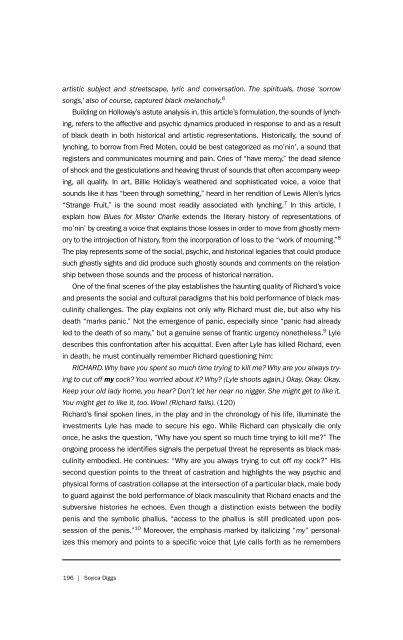The Body Artist - Alejandrocasales.com
The Body Artist - Alejandrocasales.com
The Body Artist - Alejandrocasales.com
Create successful ePaper yourself
Turn your PDF publications into a flip-book with our unique Google optimized e-Paper software.
artistic subject and streetscape, lyric and conversation. <strong>The</strong> spirituals, those ‘sorrow<br />
songs,’ also of course, captured black melancholy. 6<br />
Building on Holloway’s astute analysis in, this article’s formulation, the sounds of lynching,<br />
refers to the affective and psychic dynamics produced in response to and as a result<br />
of black death in both historical and artistic representations. Historically, the sound of<br />
lynching, to borrow from Fred Moten, could be best categorized as mo’nin’, a sound that<br />
registers and <strong>com</strong>municates mourning and pain. Cries of “have mercy,” the dead silence<br />
of shock and the gesticulations and heaving thrust of sounds that often ac<strong>com</strong>pany weeping,<br />
all qualify. In art, Billie Holiday’s weathered and sophisticated voice, a voice that<br />
sounds like it has “been through something,” heard in her rendition of Lewis Allen’s lyrics<br />
“Strange Fruit,” is the sound most readily associated with lynching. 7 In this article, I<br />
explain how Blues for Mister Charlie extends the literary history of representations of<br />
mo’nin’ by creating a voice that explains those losses in order to move from ghostly memory<br />
to the introjection of history, from the incorporation of loss to the “work of mourning.” 8<br />
<strong>The</strong> play represents some of the social, psychic, and historical legacies that could produce<br />
such ghastly sights and did produce such ghostly sounds and <strong>com</strong>ments on the relationship<br />
between those sounds and the process of historical narration.<br />
One of the final scenes of the play establishes the haunting quality of Richard’s voice<br />
and presents the social and cultural paradigms that his bold performance of black masculinity<br />
challenges. <strong>The</strong> play explains not only why Richard must die, but also why his<br />
death “marks panic.” Not the emergence of panic, especially since “panic had already<br />
led to the death of so many,” but a genuine sense of frantic urgency nonetheless. 9 Lyle<br />
describes this confrontation after his acquittal. Even after Lyle has killed Richard, even<br />
in death, he must continually remember Richard questioning him:<br />
RICHARD. Why have you spent so much time trying to kill me? Why are you always trying<br />
to cut off my cock? You worried about it? Why? (Lyle shoots again.) Okay. Okay. Okay.<br />
Keep your old lady home, you hear? Don’t let her near no nigger. She might get to like it.<br />
You might get to like it, too. Wow! (Richard falls). (120)<br />
Richard’s final spoken lines, in the play and in the chronology of his life, illuminate the<br />
investments Lyle has made to secure his ego. While Richard can physically die only<br />
once, he asks the question, “Why have you spent so much time trying to kill me?” <strong>The</strong><br />
ongoing process he identifies signals the perpetual threat he represents as black masculinity<br />
embodied. He continues: “Why are you always trying to cut off my cock?” His<br />
second question points to the threat of castration and highlights the way psychic and<br />
physical forms of castration collapse at the intersection of a particular black, male body<br />
to guard against the bold performance of black masculinity that Richard enacts and the<br />
subversive histories he echoes. Even though a distinction exists between the bodily<br />
penis and the symbolic phallus, “access to the phallus is still predicated upon possession<br />
of the penis.” 10 Moreover, the emphasis marked by italicizing “my” personalizes<br />
this memory and points to a specific voice that Lyle calls forth as he remembers<br />
196 | Soyica Diggs







